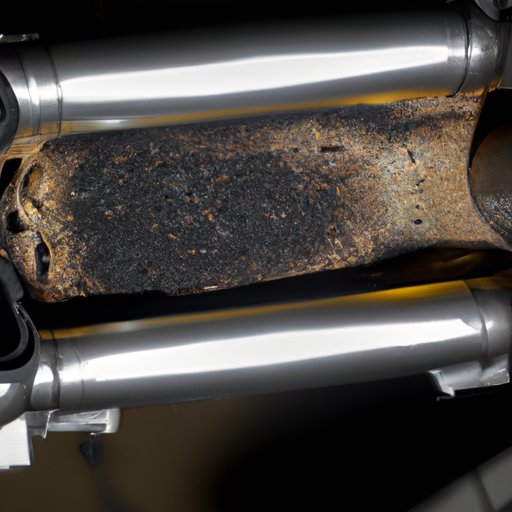
I. Introduction
When you own a vehicle, there are several parts that need to be maintained, repaired, and sometimes replaced for optimal performance. One such part is the catalytic converter. In this article, we will explore the role of catalytic converters, the environmental implications of removing them, the costs associated with having them, and tips for maintaining them properly.
II. The Environmental Cost of Removing Catalytic Converters: Do You Really Need to Do It?
Removing a catalytic converter from a vehicle may seem like a quick fix to improve its performance. However, it has negative environmental implications. A catalytic converter works by transforming harmful pollutants from your vehicle’s exhaust into less harmful emissions. Without a catalytic converter, these pollutants are released into the air and can cause respiratory problems, harm plant life, and disrupt ecosystems.
For the sake of our environment, it is necessary to have a catalytic converter installed in all vehicles. In fact, many countries have strict regulations regarding emissions that vehicles must meet. Removing your catalytic converter can also result in legal trouble and hefty fines. Arguments against removing catalytic converters include the fact that it’s not good for the environment and that it’s illegal. Ultimately, it’s important to consider the long-term effects and potential consequences before removing your vehicle’s catalytic converter.
III. Catalytic Converters: A Critical Piece of Your Car’s Emissions System
So how do catalytic converters work? Essentially, this device uses chemical reactions to convert the emissions that leave your vehicle’s exhaust into safer components. In the converter, a catalyst such as palladium, platinum, or rhodium is added. When the exhaust passes through the converter, the catalyst triggers a reaction that transforms harmful emissions into less harmful ones. The result is a decrease in carbon monoxide, hydrocarbons, and nitrogen oxide levels. Overall, this technology plays a critical role in reducing harmful pollutants emitted by cars.
The benefits of having a catalytic converter include improved air quality, a reduction in respiratory problems, and a less negative impact on the environment. In areas with high pollution, catalytic converters can help improve air quality and protect local ecosystems. Similarly, they play a crucial role in reducing emissions of harmful greenhouse gases and carbon monoxide.
IV. Breaking Down Catalytic Converter Costs: Is It Worth the Investment?
While it may be tempting to cut corners by not installing a catalytic converter, the benefits of having one outweigh the potential costs of not doing so. Not only can this lead to cleaner air, but it can also ensure compliance with vehicle emissions regulations. While the immediate cost of catalytic converters can be high, the cost savings in the long run could be significant compared to paying fines for removing them unlawfully or encountering higher fuel costs.
When considering whether or not to invest in a catalytic converter, it is important to weigh the costs and benefits. The factors that determine which type of catalytic converter to install include vehicle make and model, engine size, vehicle age, state requirements, and budget. Cost considerations include the cost of parts, installation, and maintenance, as well as any added expenses that come with purchasing high-performance converters.
V. Why Most States Require Catalytic Converters & the Fine for Unlawful Removal
The majority of U.S. states currently require vehicles to have catalytic converters. These regulations were put in place to limit the negative impact of emissions on the environment and on people’s health. It is illegal to remove catalytic converters in most states, and fines for unlawful removal can be quite steep. Fines can range from hundreds to thousands of dollars per violation. In addition, those who remove converters could face prosecution in court.
VI. The Pros & Cons of High-Flow Catalytic Converters
While all converters serve the same essential purpose, upgrading to a high-flow catalytic converter could offer potential performance boosts. These converters flow more freely, allowing your vehicle’s engine to expel exhaust gases more efficiently. High-flow converters can result in a boost in horsepower and torque, but they can also increase the price tag for the vehicle as well as require more frequent maintenance.
The upgrade also requires professional installation, so it’s important to consider the cost of both the upgrade and installation. It’s also important to note that high-flow catalytic converters may not meet emissions regulations in some states, so it’s important to check with state regulations before purchasing.
VII. Maintaining Your Catalytic Converter: Tips & Tricks
Just like any other part of your car, proper maintenance can go a long way in ensuring that your catalytic converter works efficiently and lasts as long as possible. One way to ensure your catalytic converter lasts is to make a habit of having your vehicle’s exhaust system serviced regularly by a professional. This will ensure that the converter is in great shape and that the system is working as it should. Another tip is to be aware of any warning signs of failing emissions, including poor fuel economy, reduced performance, and the check engine light turning on.
VIII. Conclusion
In conclusion, catalytic converters play a critical role in our environment and in the performance of our vehicles. Not only do they limit harmful emissions and improve air quality, but they also help us comply with state and federal regulations. While the cost may seem high, the investment is worth it in the long run. By maintaining your catalytic converter properly and ensuring that it is working efficiently, you can help to lengthen its lifespan and ensure that your car operates at its best.




